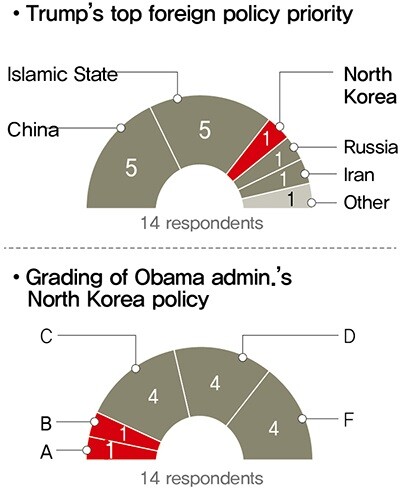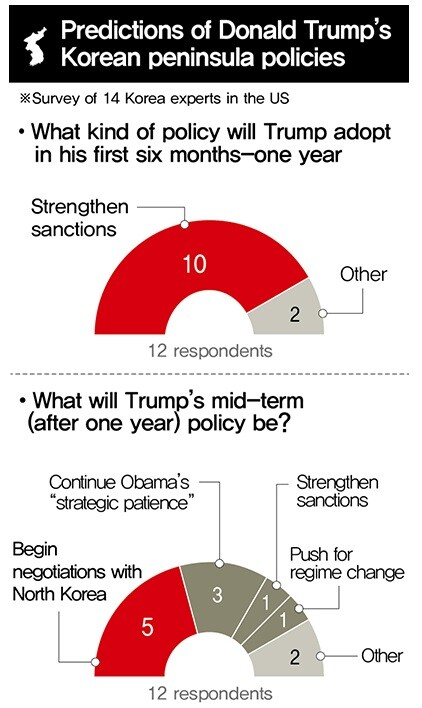hankyoreh
Links to other country sites 다른 나라 사이트 링크
Majority of US experts support negotiations to freeze N. Korea’s nuclear program

Amid a sharp public debate over the North Korean policy of the next administration that has taken place between hardliners and pragmatists in Washington since before the US presidential election, it turns out that a significant number of pragmatists support the idea of entering negotiations with North Korea with the short-term goal of freezing the North’s nuclear program.
In a survey of American experts on Korean affairs that the Hankyoreh carried out after Trump’s election as US president, from Nov. 9 to 13, the Hankyoreh asked experts for their personal view on adjusting the short-term goal of negotiations with North Korea from denuclearization to freezing the North’s current nuclear program. Of the 14 experts who responded to the survey, 11 expressed their support for this position, while just three were opposed.
“We need to remember the Korean proverb that talks about fixing the barn after the cattle are gone. Since Kim Jong-un is never going to give up his nuclear weapons, it’s much more practical and achievable for us to pursue negotiations aimed at putting a freeze on the North’s nuclear tests and missile launches,” said Dennis Halpin, a researcher at Johns Hopkins University and a former advisor for the House Committee on Foreign Affairs.
Significantly, middle-of-the-road experts were joined by several well-known hawks in expressing their conditional support for a freeze on the North’s nuclear program, though they spoke on condition of anonymity.

“I support [negotiations aimed at a nuclear freeze], though I don’t think they’ll be very successful. Even if the negotiations are successful, of course, Pyongyang will break the agreement. But the US still needs to make an effort to negotiate,” said a researcher at a defense think tank who is considered to have a very hardline stance on North Korea, even inside the US.
An expert at one of the US’s top four think tanks who is also considered a hawk on North Korea also agreed with dialogue of this sort: “We need to rein in a nuclear program that is out of control.”
On the other hand, an expert who worked for the Clinton administration expressed a strongly negative view on dialogue aimed at a nuclear freeze: “How would you confirm [that the nuclear program was frozen]? How long would it be frozen for? Most importantly, is North Korea even willing to freeze the program? A nuclear freeze is a mirage.”
Signs that Washington experts feel the need for dialogue with North Korea appear to be connected with criticism of the Obama administration‘s policy toward North Korea.
When asked to grade the Obama administration’s policy toward North Korea, most of the 14 respondents gave him a C, D and F (four experts for each grade). Obama only received an A or B from one expert each.
“Things have gotten worse across the board. North Korea has more nukes, more nuclear fuel and more missiles; human rights violations are continuing; and the cyber threat is increasing. The North Korean policies of Obama, South Korean Presidents Lee Myung-bak [2008-2013] and Park Geun-hye [2013-present], Japanese Prime Minister Shinzo Abe [2012-present] and Chinese President Xi Jinping [2012-present] have been a complete failure,” said a senior analyst at a Washington think tank who gave Obama an F.
Perhaps because of the unexpected election of Republican Party candidate Donald Trump as US president, the Korean affairs experts who participated in the Hankyoreh‘s survey were very tentative in their responses.
Nine out of the 14 experts who responded to the survey asked to remain anonymous. In addition, most of the experts added disclaimers such as “this is just guesswork” and “we don’t have any information.” That can be taken as evidence of how hard it is to predict the future North Korean policy of a Trump administration.
A few experts who respectfully declined to answer the survey excused themselves because of the “unpredictability” of the Trump administration.
“Until appointments are made for key positions in the administration, it will be hard to say. It‘s best not to jump to conclusions,” advised an expert at the Center for Strategic and International Studies (CSIS), which is a moderate to right-leaning think tank.
“It seems a little early to be discussing the North Korea policy of the Trump administration,” said a senior analyst at the Brookings Institution, which is a moderate to left-leaning think tank.
Another expert on Korean affairs at the same institute admitted the difficulty of the question: “I’d have to rely on sheer guesswork instead of facts. It‘s not that I’m uninterested in the survey, but I really don‘t have any answers to give.”
By Yi Yong-in, Washington correspondent
Please direct questions or comments to [english@hani.co.kr]

Editorial・opinion
![[Column] Samsung’s ‘lost decade’ and Lee Jae-yong’s mismatched chopsticks [Column] Samsung’s ‘lost decade’ and Lee Jae-yong’s mismatched chopsticks](https://flexible.img.hani.co.kr/flexible/normal/500/300/imgdb/original/2024/0512/3017154788490114.jpg) [Column] Samsung’s ‘lost decade’ and Lee Jae-yong’s mismatched chopsticks
[Column] Samsung’s ‘lost decade’ and Lee Jae-yong’s mismatched chopsticks![[Correspondent’s column] The real reason the US is worried about Chinese ‘overcapacity’ [Correspondent’s column] The real reason the US is worried about Chinese ‘overcapacity’](https://flexible.img.hani.co.kr/flexible/normal/500/300/imgdb/original/2024/0510/5217153290112576.jpg) [Correspondent’s column] The real reason the US is worried about Chinese ‘overcapacity’
[Correspondent’s column] The real reason the US is worried about Chinese ‘overcapacity’- [Editorial] Yoon’s gesture at communication only highlights his reluctance to change
- [Editorial] Perilous stakes of Trump’s rhetoric around US troop pullout from Korea
- [Guest essay] Preventing Korean Peninsula from becoming front line of new cold war
- [Column] The state is back — but is it in business?
- [Column] Life on our Trisolaris
- [Editorial] Penalties for airing allegations against Korea’s first lady endanger free press
- [Editorial] Yoon must halt procurement of SM-3 interceptor missiles
- [Guest essay] Maybe Korea’s rapid population decline is an opportunity, not a crisis
Most viewed articles
- 1[Column] Samsung’s ‘lost decade’ and Lee Jae-yong’s mismatched chopsticks
- 2Seoul’s plan to adopt SM-3 missiles is like wanting a sledgehammer to catch a fly
- 3‘We must say no’: Seoul defense chief on Korean, USFK involvement in hypothetical Taiwan crisis
- 4Yoon rejects calls for special counsel probes into Marine’s death, first lady in long-awaited presse
- 5S. Korean arrested and detained in Russia under espionage charges for first time in history, Moscow
- 6Korea poised to overtake Taiwan as world’s No. 2 chip producer by 2032
- 7[Book review] Who said Asians can’t make some good trouble?
- 8S. Korea “monitoring developments” after report of secret Chinese police station in Seoul
- 9Yoon voices ‘trust’ in Japanese counterpart, says alliance with US won’t change
- 10[Correspondent’s column] The real reason the US is worried about Chinese ‘overcapacity’